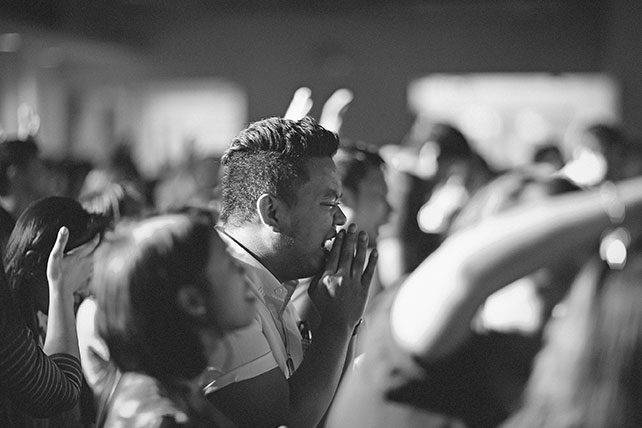My wife and I had an interesting experience one year at Calvin Worship Symposium. We learning something about the importance of worship context. It happened on a Thursday night at the Covenant Fine Arts Center. The auditorium was beautifully prepped for worship with themed hangings and well-designed lighting on and around the stage. The worship team was first rate. And the service began with an inspired playing of a Bach prelude — that very few of us actually heard because virtually no one was paying attention.
Worship Context, Behavior, and Faith
How sad that a room full of worship leaders (many of us organists) could be so oblivious to a remarkable gift of praise offered by one of our own. It made me think of another time, years earlier, when my denomination’s General Assembly met in Charlotte, NC. Opening worship was held in an NBA arena, and thousands of otherwise well-bred (mostly Southern) Presbyterians behaved like, well, basketball fans. As I recall, they even cheered the Prayer for Illumination! It seems that humans, even baptized ones, take our cues from other humans—and from our worship context. The Symposium crowd wasn’t intentionally shunning a hugely gifted young organist, we were gathering in a concert venue, and that night the majority of us behaved like we would at a concert—catching up on life details with Meg and Jake two rows behind us as the “performers” were warming up, and then settling in to enjoy the “show.”
Forming Faith
I bring this up now, not as a rant, but as a point to ponder in the midst of this behavior-shaping / faith-shaping season we call Lent—a six-week intensive when followers of Jesus are encouraged to take stock of all that influences us and to weigh the reality of our responses against the potential of a gospel-shaped life.
I have a friend who loves Jesus deeply. He and his wife are faithful in daily Bible study and prayer, regular participants in worship and fellowship, and absolutely extravagant in missional generosity. But he struggles with profanity and a constant ground note of anger because of the environment in which he works five days a week. We all know (and are) people who want to follow Jesus faithfully, but we can easily be led in very different directions, partly because of our context, and partly because of the actions (or inaction) of others. “All we like sheep have gone astray…” Can I get a bleat from the church?
I’m pretty sure blabbing through the Preparation for Worship will not determine where you spend eternity (although the worship leader might have a suggestion for you), and we can’t take on the expansive influence of the world, the flesh, and the Devil in one blog post, but we can consider how the context in which we worship shapes our behavior, and how our behavior not only shapes our faith but also impacts the worship and the faith of the people around us. This is where it gets important.
Context Matters
As part of their work toward a D.Min. in Transforming Congregations, I have my students “exegete” worship spaces: what do they see first and what visual cues are more subtle? What does the congregation appear to value, and what seems superfluous? What type of people seem most likely to be attracted to worship in this place, and how would they worship once they got here? It’s amazing what a room can tell you.
As any coffee shop owner knows, space is anything but neutral in shaping behavior. Walk into the immensity and beauty of a cathedral, and you are immediately drawn beyond yourself. Sit in the time-worn embrace of a small community church, and you can almost hear the hymns and prayers of the “cloud of witnesses” who called that place home over the years. Environment matters. Just ask any church planter about the challenge of shaping and leading worship amid the lingering aroma of middle school lunches.

